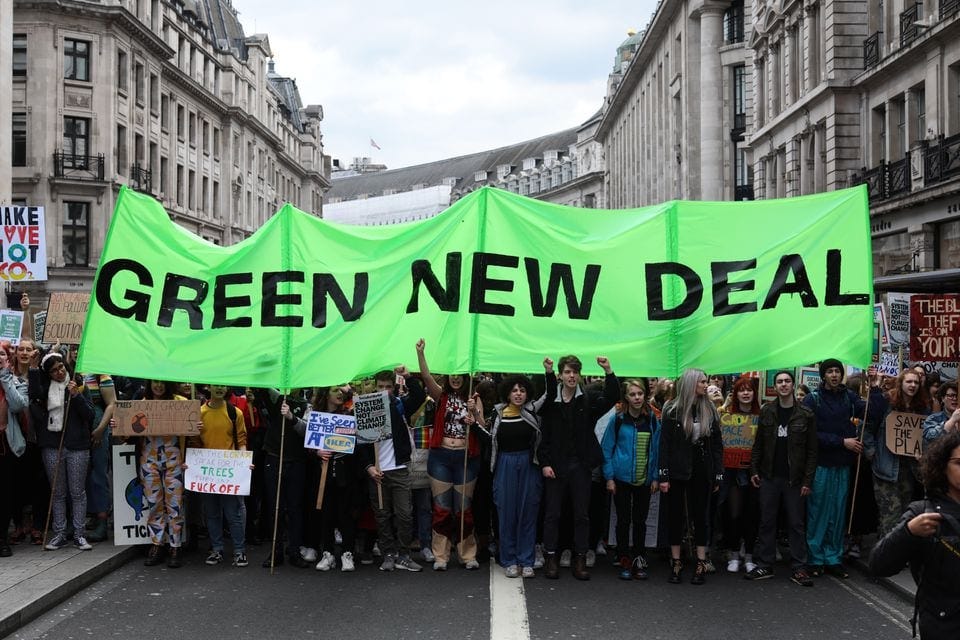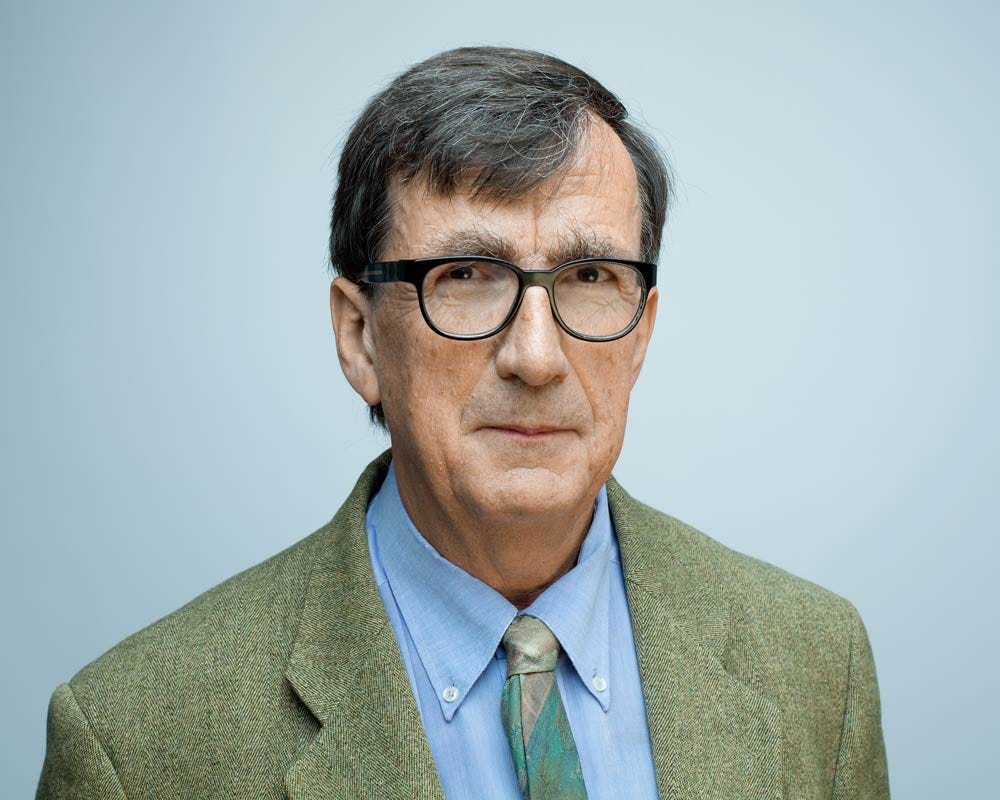Everything is connected
Citizen participation in sustainable energy doesn't fall from the sky
Citizen’s support for our collective move towards zero-carbon societies are obviously important. Green New Deals especially emphasize the intersection of a revitalization of democracy and decarbonization of the economy.
“a Green New Deal must be developed through transparent and inclusive consultation, collaboration, and partnership” and “[ensure] the use of [inclusive] democratic and participatory processes”. (AOC and Markey’s Resolution)
“A radical Green New Deal must […] enable democratic participation, accountability and common ownership. Our economy must work in the interest of everyone, which means empowering those communities currently marginalised. (Common Wealth’s proposal for UK GND)

March for Green New Deal in UK, picture by 350.org
But what do people support? One survey might find broad support for bold climate action, another might tap into the scepticism and anger of the (proverbial) gilets jaunes. Or take the infamous value-action gap: people profess their adherence to one principle but practice a quite different one. One version of this gap is the resistance against a new wind park site by people otherwise in favour of sustainability policy.
One problem is that surveys measures a rather artificial situation – us responding to a question posed on the telephone, written on a piece of paper, on presented on a screen, divorced from our everyday life. Our values are not these isolated entities that we pick from the shelf whenever someone asks for them. Our values are acts of evaluation – and acts are necessarily contextual: we act in and upon a situation. Our methods should be contextual as well therefore.
The idea that you can’t understand ideas in isolation goes back a long way. Probably its most influential modern formulation is by a linguist called Ferdinand De Saussure, who proposed to study language as a system in which the meaning of every single linguistic element (whether lexical or grammatical) depended on the contrast with other signifying elements. This principle proved so wildly attractive that it found its way into seemingly every nook of the human sciences – or at least every nook of science in France. Everything became language-like and so everything needed to be grasped as (a meaningful) system. Psychoanalyst Jacques Lacan found that the unconscious is structured like a language, literary theorist Roland Barthes discarded the author’s intentions for internal relations within the text, while anthropologist Claude Levi-Strauss uncovered the ordered (and mostly unconscious) work of the human mind to build our kinship systems and shape our collective and personal myths. The name of this new game in town: structuralism.

Levi-Strauss when he was still a young buck in his 60s (he would live to a hundred).
One very famous second-generation structuralist called Pierre Bourdieu wouldn’t have wanted me to call him a structuralist. However, he did take up many of the concerns of the structuralist paradigm – in particular its emphasis on the connections between every thing. He called this fundamental approach his relational philosophy and preached its gospel whenever he could: ye shall find the truth not in the things themselves, but in the relations between them. Can this philosophy save us from our analytical and political predicament?

Bourdieu looking very philosophical.
The structural choice
Butler et al 2016 show the way. (We already encountered Butler and her colleagues in this early issue about muggles and tree-huggers, which is to say, about regimes and niches.) They want to understand what we are talking about when we talk about the “choices” people make to consume more or less energy. Inspired by Bourdieu, they posit we cannot assume a detached actor, with a view from nowhere, making impartial and fully ‘rational’ evaluations about the (environmentally) best course of action. So instead they ask in what contexts such choices are made.
Take these reflections on laundry routines from one of their interviewees:
. . . I would have a choice not to wash clothes but this generation, your generation and my daughter’s generation, they wash things every day, their working clothes every day. They have showers every day and that is the way that they have been brought up . . . that’s the way . . . that they don’t know any different, whereas my mother’s generation their clothes, their outer clothes weren’t washed hardly ever. They used to have woollen stuff and things like that and washing was a real struggle once a week so they never washed anything at the drop of a hat so that’s the difference, it’s that we are used to having cheap, available energy all the time. (Debbie, 50 years) (p 893)

The contested laundry machine (picture by Debbie).
As the authors conclude, Debbie sees her daughter’s choice as more constrained as her own, as it is made in the context of “widespread available energy, washing machines, forms of clothing” and “expectations arising from interaction with others regarding showering and washing clothes everyday” (p 893). Debbie has more of a choice because she can detach herself a little more from that context, having seen other days.
Cara (35 years) also talks about the multiple logics tugging at her ‘rationality’: she relates how, since having had a baby 8 months ago, she no longer thinks about energy consumption at all. She just does whatever her role as parent requires of her. Energy use, in other words, is not just about our (environmental) values, but is
“connected to notions of, for example, wanting to provide the best or the necessary for our families, which in turn is connected to wider social structures that serve to reproduce what constitutes ‘the best’, ‘the necessary’ in different contexts.” (p 898)
Energy citizenship
These examples already make quite clear that ‘energy values’ cannot be easily reduced to an ‘aye’ or ‘nay’. Divorced from context it would be difficult to say what the implications of an ‘aye’ or ‘nay’ for policy should be (*cough* Brexit *cough*). So, if not ‘consent’ or ‘rejection’, what role can people play in public deliberations about the future of our energy system?
As it so happens, there is a third-generation structuralist relational approach to people’s participation in publics. The approach, revolving around the work of Bruno Latour, claims we assemble our opinions and our positions in public debates in response to particular issues and in engagement with (physical) objects of concern. Again, values are not pre-given, but contextual – and thus open to change. (And, yes, fine, calling Latour structuralist is a bit of a stretch. Still, his thinking is strongly informed by the same relational project that started with De Saussure.)

Bruno Latour upon receiving the Holberg Prize. Photo by Manuel Braun.
We find torch-bearers on this second relational path in the persons of Ryghaug and colleagues (2018). In their discussion of interviews with Tesla owners, prosumers in smart grids and owners of PV panels, they emphasize the ability of people to evolve their stance. Thus, in the case of the Tesla owners, many
say that they acquired their vehicles not because of environmental or climate concerns. By driving the vehicle, and through mundane encounters with criticism, however, many report the emergence of profound environmental attitudes, especially after ‘reading up’ on environmental and energy related aspects of the vehicle. (p 292)
Smart grid technologies showed the same potential of engendering transformation.
On the one hand, many [respondents] highlight how mundane routines such as showering, laundry and cooking are static and very difficult to change. On the other hand, they also evoke instances where smart energy technologies have enabled them to engage with, challenge and sometimes change such routines. (p 294)
The crux is that these technologies have brought ‘energy’ out of the obscure background, turning it into something “visible and tangible” (p 293). In response to this newly perceived issue, people may seek out new knowledge, and develop new practices. They start timing laundry or dishwashing differently, or establish new household rules about energy is to be used.
Implications
It may seem each article points to different implications: if Butler et al emphasize the constraints on people’s ‘choices’ – social and material structures, like cheap energy or hygiene norms – as a policy-maker you’ll want to target these constraints. They do present this point with a twist: we should look at the values embedded in our societal (infra)structures (say, how bike-friendly our roads are), instead of trying to enable people’s ‘environmental’ values. We can and should expect more from the state here in engendering different constraints (and tree-huggers to points us to where the unsustainable constraints are institutionalized).
For Ryghaug et al, constraints can be productive. They can generate new ideas and feelings, whether in the form of opportunities for people to give shape to their individual responsibility, or in the form of frustrations in people’s routines. We should capitalize on these engagements and design energy technology that allows a greater diversity of people to have those new engagements, and open energy up to a more broadly shared debate or dialogue (p 294).
In this, both articles come together: other choices are possible when people are able to extract themselves somewhat from their routines and their taken-for-granted assumptions. The political relevance of these relational approaches is therefore as follows. Instead of waiting for people to adopt the environmental values necessary to support climate policy, we should create spaces of practical involvement – “material participation” in Ryghaug et al’s words – which allow people to develop their ideas, invite them into public debate, and can give them therefore (a sense of) ownership of the transition.
This is the fourth in a series in which I take classical anthropological work from a class on the history of anthropology I co-teach and see if it might help us look differently at the challenges of transitioning away from a fossil-fuelled economy. Except this time I cheated. I was building up a backlog of life. So while I should have talked about structuralism, instead I just talked about relational sociology. To the Levi-Strauss fan out there, forgive me and stay strong! To all, keep on keeping on or try something new!
Got this through a friend and like what you see?
Sources
Butler, Catherine, Karen A Parkhill, and Nicholas F Pidgeon. 2016. "Energy consumption and everyday life: Choice, values and agency through a practice theoretical lens". Journal of Consumer Culture. 16 (3): 887-907. https://doi.org/10.1177/1469540514553691
Note: if you’re curious about the theoretical underpinnings of this (Bourdieuan) context-sensitive approach to energy consumption, you might like the following article:
Wallenborn G., and Wilhite H. 2014. "Rethinking embodied knowledge and household consumption". Energy Research and Social Science. 1: 56-64. https://doi.org/10.1016/j.erss.2014.03.009
Ryghaug, Marianne, Tomas Moe Skjølsvold, and Sara Heidenreich. 2018. "Creating energy citizenship through material participation". Social Studies of Science. 48 (2): 283-303. https://doi.org/10.1177/0306312718770286
Note: They build on the work on Noortje Marres, one of Latour’s collaborators on the Making Things Public project. The idea of “material participation” is hers. If you like Ryghaug et al’s idea, you should check out her work too:
Marres, Noortje. 2013. "Why political ontology must be experimentalized: On eco-show homes as devices of participation". Social Studies of Science. 43 (3): 417-443. https://doi.org/10.1177/0306312712475255
Marres, Noortje. 2007. "The Issues Deserve More Credit: Pragmatist Contributions to the Study of Public Involvement in Controversy". Social Studies of Science. 37 (5): 759-780. https://doi.org/10.1177/0306312706077367
PS: If you do not have the appropriate credentials to cross the paywall to these articles, maybe you can check out https://sci-hub.tw (just copy paste in the doi number), or if you are uncomfortable with that, send me a message and I’ll lend you a copy.
